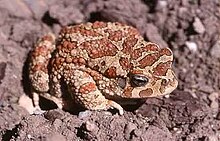Berber toad
| Berber toad | |
|---|---|

| |
| Scientific classification | |
| Domain: | Eukaryota |
| Kingdom: | Animalia |
| Phylum: | Chordata |
| Class: | Amphibia |
| Order: | Anura |
| Family: | Bufonidae |
| Genus: | Sclerophrys |
| Species: | S. mauritanica
|
| Binomial name | |
| Sclerophrys mauritanica | |
| Synonyms[2] | |
| |
The Berber toad, also known as Mauritanian toad, Moroccan toad, pantherine toad or Moorish toad (Sclerophrys mauritanica),[2] is a species of toad in the family Bufonidae, which is found in north-western Africa, with an introduced population in southern Spain.
Description
[edit]The Berber toad is a large toad, reaching 13–15 cm in body length. The upperparts are beige to olive with large orange or red spots. The underparts are white with small grey spots. It can be found in a variety of colour morphs, with the back colour varies from dark patches of brown, olive, orange, or reddish brown to just a plain sandy colour.[3]
Distribution
[edit]The Berber toad is found in north western Africa, occurring in Morocco eastwards through Algeria into Tunisia, and south to the northernmost part of Western Sahara, although this has yet to be confirmed.[1] An introduced population is also present in Spain close to Los Alcornocales Natural Park in the vicinity of Algeciras.[4]
Habitat
[edit]Its natural habitats are subtropical or tropical dry cork oak forests, subtropical or tropical dry shrubland, rivers, freshwater marshes, intermittent freshwater marshes, arable land, pastureland, plantations and urban areas.[5] Berber toads range up to 2,650 m above sea level in the Atlas Mountains.[1]
Habits
[edit]It breeds in fresh or brackish still or slow-flowing bodies of water. The females deposit approximately 5,000–10,000 eggs. During the day the adults hide under rocks or in tunnels.[5]
Taxonomy
[edit]Originally placed in the genus Bufo but was placed in the African genus Amietophrynus for the former 20-chromosome "Bufo" in 2009 and then Amietophrynus was renamed Sclerophrys as the type species Sclerophrys capensis was named as such, so Amietophrynus is a junior synonym of Sclerophrys.[6]
References
[edit]- ^ a b c David Donaire-Barroso, Alfredo Salvador, Iñigo Martínez-Solano, Mario García-París, Ernesto Recuero Gil, Tahar Slimani, El Hassan El Mouden, Tahar Slimani, Philippe Geniez.; Ulrich Joger (2016). "Sclerophrys mauritanica". IUCN Red List of Threatened Species. 2016: e.T54703A107348349. doi:10.2305/IUCN.UK.2016-3.RLTS.T54703A107348349.en. Retrieved 11 November 2021.
{{cite journal}}: CS1 maint: multiple names: authors list (link) - ^ a b c Frost, Darrel R. "Sclerophrys mauritanica (Schlegel, 1841)". Amphibian Species of the World 6.0, an Online Reference. American Museum of Natural History. Retrieved 2016-11-13.
- ^ "Bufo mauritanicus". Encyclopedia of Life. Retrieved 2016-11-13.
- ^ Christopher Lever (2003). Naturalized Reptiles and Amphibians of the World. Oxford University Press. p. 176. ISBN 0198507712.
- ^ a b "Sclerophrys mauritanica". Amphibiaweb. Retrieved 2016-11-13.
- ^ Frost, Darrel R. (2016). "Sclerophrys Tschudi, 1838". Amphibian Species of the World: an Online Reference. Version 6.0. American Museum of Natural History. Retrieved 23 January 2016.

